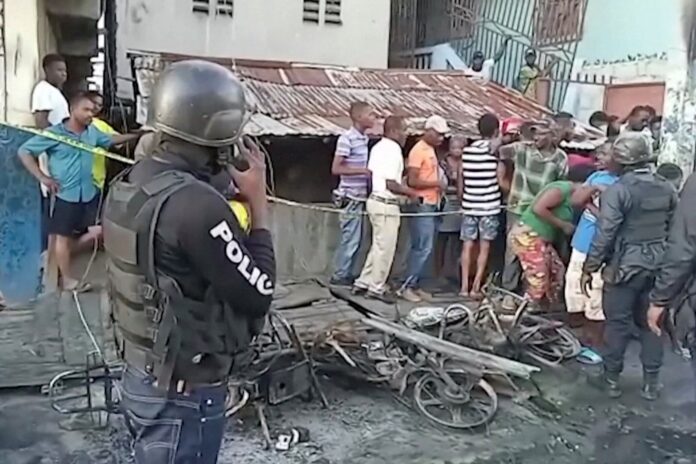Scores more were injured in the blast. It was the latest tragedy to hit the country, which has been rocked by political violence, natural disasters, poverty and hunger.
PORT-AU-PRINCE — More than 60 people were killed and scores more were wounded around midnight on Tuesday when a truck carrying gasoline exploded in northern Haiti, according to officials.
The truck, carrying 9,000 gallons of fuel, swerved and toppled over in a residential area of the city of Cap-Haïtien, according to local officials and witnesses. A crowd gathered to siphon off its gas and it exploded, scorching everything in a hundred-yard radius, said Frandy Jean, the head of firefighters for northern Haiti.
“It’s the first time since I’ve been a firefighter, in over 17 years, that I have lived such a catastrophe,” Mr. Jean, 49, said.
Haiti’s electrical grid is unreliable, so much of the country — including banks, hospitals and businesses — relies on generators for power. But the gangs that control access to fuel terminals have blocked deliveries over the last few months.
This has left Haitians facing a shortage and desperate for fuel, and, witnesses said, willing to risk approaching the downed truck to collect gas.
Beyond the dozens of dead, hundreds were also injured in the explosion, the office of the mayor of Cap-Haïtien said on Twitter.
“I am distraught at the tragedy affecting our city,” said the mayor of Cap-Haïtien, Yvrose Pierre, on Twitter. “All my thoughts are with the victims and all their loved ones in these tragic times.”
Patrick Almonor, the city’s deputy mayor, said that around 20 houses in the area were set on fire by the explosion and that the number of casualties released so far did not include those who may have died inside their homes, local media reported.
Videos and photos shared on social media showed flames erupting and black smoke billowing into the air above what appeared to be the charred carcass of a truck. Footage from the aftermath showed half a city block blackened by the explosion, with more than a dozen bodies covered in white sheets strewn on the ground among the twisted remains of scorched vehicles.
Prime Minister Ariel Henry, writing on Twitter, said medical teams were being dispatched to the site, and declared three days of mourning.
Mr. Henry later said he would be traveling to Cap-Haïtien with a number of government officials, doctors and emergency medical workers.
“I will take this opportunity to express my solidarity with the grieving families,” he added.
The two major hospitals in the area were both overwhelmed by dozens of people needing care, hospital officials said, and were asking for help from other hospitals and the public because they lack even the most basic supplies, such as sheets, to attend the wounded.
The injured included burn victims, officials said, and those who were trampled as people fled the scene.
The country’s services, long in a state of disrepair, have been battered as Haiti has been rocked by cascading tragedies.
Since July, when President Jovenel Moïse was assassinated, the Caribbean island nation has suffered a devastating earthquake and flash floods, disasters that left over 2,000 dead and many more injured and displaced.
The natural disasters have been compounded by poverty, hunger and increasing violence.
In recent months, a severe fuel shortage pushed the nation even deeper into collapse. Gangs, not the government, now control large areas of the country, and they have taken advantage of the need for fuel, hijacking gas trucks at will and blocking deliveries. Many truck drivers refused to work in October, in a nationwide strike that paralyzed the country.
In the capital, Port-au-Prince, gangs have become increasingly brazen, kidnapping people en masse and targeting everyone from school children to local religious leaders.
In October, 17 people and their children who had been working with an American Christian aid group were kidnapped after visiting an orphanage. Only five have been freed so far. The gang that detained the hostages, called 400 Mawozo, initially demanded a ransom of $17 million for their release.
Former Prime Minister Claude Joseph, who briefly took control of Haiti’s government immediately after the assassination, said he was heartbroken by the news of the explosion.
“I share the pain and sorrow of all the people,” he wrote on Twitter.




























![Phyllisia Ross – KONSA [Official Music Video]](https://haitiville.com/wp-content/uploads/2014/08/phyliisia.jpg)









